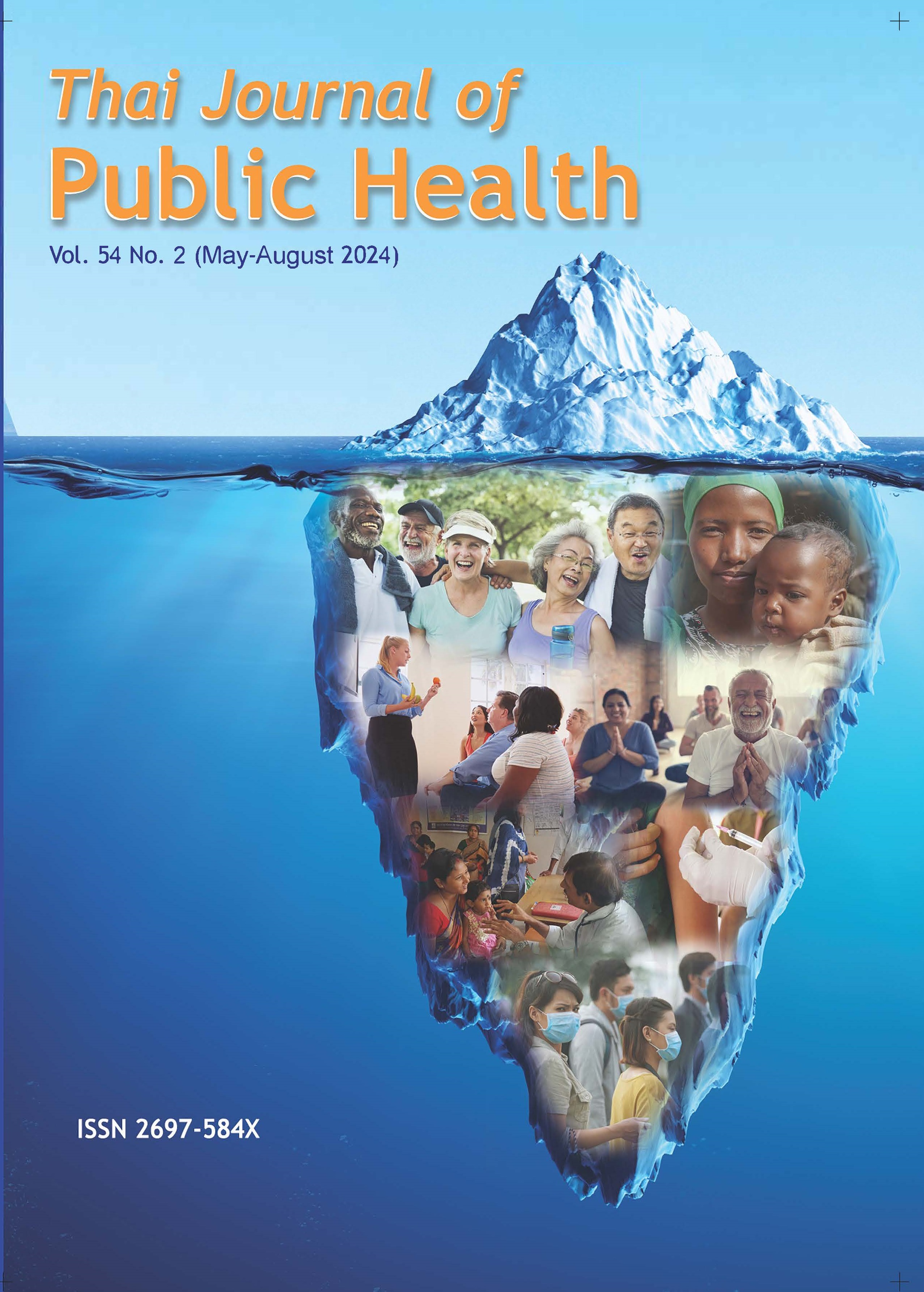The Relationship between Health Literacy and Food Supplement Product Consumption Behavior of the Elderly
Keywords:
Health literacy, Food supplement, Elderly, Consumption behaviorAbstract
This research is a survey research study by conducting a cross-section research, which aims to examine the level of health literacy of the elderly, to study the relationship between demographic characteristics and health literacy, and to discover the relationship between health literacy and food supplement product consumption behavior of the elderly. Systematic random sampling was employed. Questionnaire were used to collect the data from 353 elderly at Lak Hok, Mueang, Pathum Thani, Thailand. The data was analyzed using descriptive statistics, including frequency, percentage, mean, minimum, maximum and standard deviation. Moreover, to analyze the relationships between study variables using the Chi-square and Pearson’s correlation coefficient statistic, the p-value of .05 was considered statistically significant. The results showed that the participants had a mean age of 68.17 years old. Most of them were female (66.3%), the participants had inadequate health literacy (Mean = 152.01, SD. = 53.43). Elderly people had high scores on dietary supplement consumption behavior (Mean = 53.15, SD. = 14.19). Chi-square and Pearson’s correlation coefficient analysis showed that age, education level, occupation, household income, and source of income are significant related to health literacy at p <0.05. The relationships between health literacy and sex, marital status was not found. Health literacy significantly related to food supplement consumption with statistical significance of .05 (r=0.380, p <0.001). The results of this study suggest that health literacy and food supplement product consumption behavior need to be further supported in elderly from government agencies. And there should be a field inspection of dietary supplements in pharmacies and stores.
References
Somsri P, Sanlayawet L, Thirachai C, Bunrat U, Kidaphon W, Chatri B, et al. Drugs, supplements, and toxins that have a negative impact on the kidneys. 1th ed. Nonthaburi: Health works plus; 2017. (In Thai)
Euromonitor International. Consumer Health Global Industry Overview 2020.
Chadaphon L. Feasibility study of improvement business plan of dietary supplement product from sea squirt extract, rice bran oil vitamin e for maintain your brain and preventing Alzheimer’s disease in people who have risk brain disease. [Master of Management Program in Management, Thesis in Food Business Management]. Nakhon Pathom: College of Management, Mahidol University; 2020.
National Statistical Office. The 2017 Food Consumption Behavior Survey. Bangkok: 2018. (In Thai)
National Statistical Office. The Household Socio-Economic Survey in 2018. Bangkok: 2019. (In Thai)
Pathum Thani Provincial Statistical. Provincial statistical report: 2020. (In Thai)
Watcharaphon C. Health Literacy: Concept and application for nursing practice. Royal Thai Navy Medical Journal 2017; 44(3): 183-197. (In Thai)
Lak Hok Sub-district Health Promoting Hospital Village No.1. Sweet, Oil, and Salty Project Report 2021. (In Thai)
Sirima M. Biostatistics in Public Health. 2th ed. Bangkok: Charansanitwong printing; 2015. (In Thai)
Food and Drug Administration Ministry of Public Health. Research project on factors affecting current consumer health product consumption behavior changes. Institute for Population and Social Research: Mahidol University; 2015. (In Thai)
National Statistical Office. The 2021 Survey of The Older Persons in Thailand. Bangkok: 2022. (In Thai)
Witthaya C. Health Literacy of Self-care Behaviors for Blood Glucose Level Control in Patients with Type 2 Diabetes, Chainat Province. [Master Degree of Public Health, Thesis in Health Promotion Management]. Pathum Thani: Faculty of Public Health, Thammasat University; 2016.
Suphannika S. Behaviors and demands of elderly dietary supplement in Thailand. Journal of Humanities & Social Sciences 2020; 10(3): 12-21. (In Thai)
Kanchana P, Saowalak T. Opinions and Consumption Behaviors of Supplementary food products Among the elderly in Nongbu village, Sam Phrao Sub-district, UdonThani Province. UdonThani Hospital Medical Journal 2020; 28(2): 121-129. (In Thai)
Pichsupagarn T. Relationship between health literacy and health promotion behaviors of postpartum mothers in HRH Maha Chakri Sirindhorn Medical Center. [Master Degree of Public Health, Thesis in Health Promotion Management]. Pathum Thani: Faculty of Public Health, Thammasat University; 2018.
Yoottakan P. Health Literacy and Health Promoting Behaviors Among Karen Older Persons. [Master of Nursing Science, Thesis in Gerontological Nursing]. Chiang Mai: Chiang Mai University, 2019.
Chesser AK, Keene WN, Smothers K, Rogers N. Health literacy and older adults: A systematic review. Gerontology and geriatric medicine, 2016. DOI:10.1177/2333721416630492
Tepthai C, Saowaluk S, Artit C, Issaree P. Factors associated with Health Supplements Product Using Behaviors Among Elderly People. Boromarajonani College of Nursing, Uttaradit Journal 2021; 13(2): 87. (In Thai)
Downloads
Published
Issue
Section
License

This work is licensed under a Creative Commons Attribution-NonCommercial-NoDerivatives 4.0 International License.
Creative Commons License CC-BY-ND


